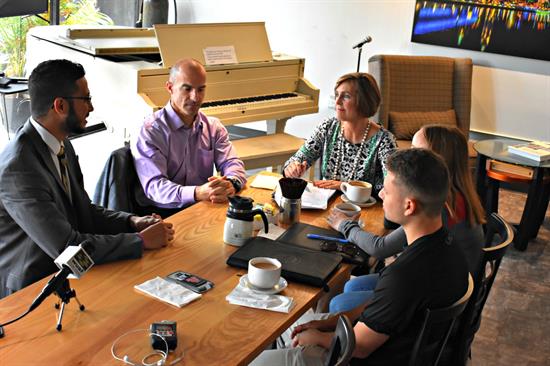U.S. Rep. Kathy Castor (FL14) brought together student government leaders from the University of South Florida and University of Tampa to discuss one of top her priorities: addressing growing student debt for families.
“As Congress focuses on tax cuts for the wealthy, it is time for hardworking students and families to demand action on what really would help their bottom line: college affordability,” said U.S. Rep. Castor. Nationwide, student loan debt is crippling families to the tune of $1.31 trillion. Such growing debt ripples outward and impacts our local economy as young people are forced to delay purchasing a home or pursuing a business. “Many Tampa Bay area families and students are forced to take out large student loans as the cost of a college education has risen dramatically over the past 30 years,” U.S. Rep. Castor said. “Vital investments like the Pell Grant have not kept pace with inflation and students are struggling to pay for tuition.”
U.S. Rep. Castor called for congressional action on renewal of the vital federal Perkins Loan for low-income and first-generation students. Republicans in Congress allowed the Perkins loan to lapse at the end of September. If not reauthorized soon, college will become very uncertain for 2.6 million students who use it. During the life of the Perkins loan, $7.9 billion in federal contributions have been leveraged with contributions from colleges and universities to generate more than $36 billion in funding for low-cost student loans. These loans have a fixed 5 percent interest rate that does not accrue until repayment begins; in addition, with a 10-year payback, the Perkins loan allows graduates to participate in our economy more quickly.
U.S. Rep. Castor also was joined by Kostas Stoilas, the Entrepreneur in Residence at Tampa Bay Wave, as well as a board member. “This is hitting me in the face right now. I have lived most of my business career with the wolf at the door,” Mr. Stoilas said, referring to his own student loans that amount to nearly his monthly rent. Stoilas emphasized how he could grow his business faster and further without $40,000 in student debt hanging over his head.
In Florida, graduates are starting their careers with an average of $23,000 in student loan debt, without the ability to discharge it or refinance as interest rates drop. At the University of Tampa, 72 percent of students receive U.S. Federal Student Loans and face an average of $31,742 in student loan debt at graduation. At the University of South Florida’s main campus in Tampa, FL, 42 percent of students receive U.S. Federal Student Loans and face an average of $22,719 in student loan debt at graduation.
Aislinn Sroczynski, a senior at the University of Tampa and the school’s student government president, also joined U.S. Rep. Castor to talk about the overwhelming student loan debt her peers are facing at the university. She is concerned that her student loan debt from her undergraduate studies will drive her decisions in the future: “I don’t want to have to compromise my career or my passion.” UT student government vice president Troy Schneider also relayed the importance of avoiding massive debts upon graduation.
“Student loan debt has been a top issue from our student body since my freshman year,” said USF Student Body President Moneer Kheireddine, who is now a senior. Moneer also said he will soon be heading to Florida’s Capitol to talk with state legislators about the rising price of higher education and the need for reform.
“The priorities of this Congress are misplaced. Instead of working to help hardworking Americans, funding for Children’s Health Insurance Program (CHIP), Perkins, community health centers and support for working families, Republican are almost solely focused on tax cuts for the wealthy,” said U.S. Rep. Castor. “I am urging my colleagues to instead recommit to critical investments in our students, our future and a stronger economy.”
###


